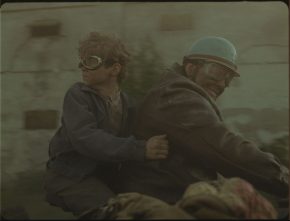What is more ingrained in British life than the monarchy, the BBC, or the British Armed Forces? Well, if you are British, you probably said it: the National Health System. And if you are not British then this might serve you as a fun fact. The NHS is considered a national treasure, they have had it since 1948 (!), and few have been more instrumental in establishing it than Aneurin “Nye” Bevan, the Welsh politician who fought tirelessly to create a healthcare system free at the point of need.
Bevan’s story is the beating heart of Tim Price’s new play Nye, staged this year at the Olivier Theatre. This is no dry political history – it is a gripping, hyper creative, and often witty portrait of a man whose passion for social change was as fierce as his commitment to the people who needed it most.
The production opens at a critical point in Bevan’s life, as the Welsh politician lies in a hospital bed in December 1959, gravely ill and unaware of the grim diagnosis awaiting him. What started off as an ulcer operation turned into a nightmarish discovery: he has end stage cancer. His wife, Jennie Lee, is by his side but reluctant to break the news. He is not aware. Barely conscious. And on morphine. Therefore he travels. And we travel with him.
The genius of this production lies not just in its rich historical details, but in how it blends memory, dreams, and reality, creating a world that constantly shifts between Nye’s life as a child, a young man, a husband, an MP and later, as the Minister of Health as well as brief scenes set in reality, around his sick bed.
Incredible might not even cover the scope of this man’s life. Bevan was a rebel at heart, a socialist who spoke openly, challenging the status quo at every turn. From his youth in South Wales, where he watched his coal miner father die from what was known as “Black Lung,” to his battle for miners’ rights, to leading the charge for union rights and universal healthcare, Nye was driven by a single goal: to serve people.

Source: The University of Manchester
It is a tale that could easily feel like a simple hero narrative, but Price’s script avoids that trap. The political landscape of the play does not simply glorify Bevan; instead, it provides a more balanced view of a man who, despite his great accomplishments, was often conflicted and flawed. A bed-hopper. Often bluntly ignorant of those closest to him. In this sense, the play captures the essence of Bevan as a human being, not just a historical figure. His fiery oratory skills, for which Churchill once remarked that he was “one of the few members I will sit still and listen to,” are brilliantly captured by Sheen, whose passionate speeches on the floor of Parliament bring Bevan’s legacy to life. Just watch out for that always-present twinkle in Sheen’s eyes. Playful. Driven. Sincere.
But what makes Sheen’s performance even more “delicious” is how nuanced he captures Nye’s vulnerability. Nye’s journey was not an easy one. He spent years struggling to find work, overcoming a childhood stutter, school bullying, political games and pitfalls. Still, he rose through the ranks, first becoming head of his miners’ union at 19, and then working tirelessly to build a political platform that would challenge the powers that be.
As the play progresses, we see Nye’s transformation from a young activist to a full-fledged politician, tackling everything from national strikes to his eventual role in the creation of the NHS. His fight to establish a free healthcare system was not only groundbreaking but also deeply personal. His decision to enter politics stemmed from the heart-wrenching realization that his father – and the rest of his family – had received no support from the government in his lengthy struggle or in his final days. “Half of my constituency is unemployed and 3 million people in the country,” Bevan declares as he battles to support first coal miners then the whole country.

Source: The Upcoming
This is a play that’s remarkably timely, and perhaps even necessary in today’s political climate. It offers a hint of hope to those of us who are disillusioned with the state of global politics. Can we really make a difference, or are we all too caught up in a system that protects the wealthy and ignores the needs of the vulnerable? Nye suggests that politicians, like Nye, do exist. People with integrity, with a passion for change, and with the courage to push for a fairer society. In a world where cynicism too often prevails, Bevan’s story feels like a rallying cry – and might just inspire the next generation of political leaders. Let’s hope so!
The production itself is a triumph. Rufus Norris’ direction, alongside the extraordinary work of designer Vicki Mortimer, creates an immersive world that cleverly blurs the lines between reality and dream. Quite a few scenes tapping into surrealism with political commentary reminded me of Kafka. And I loved the musical number: random, superbly creative and mildly crazy.
Vertical hospital beds serve as podiums for speeches, and the subtle yet striking use of sound design, complete with game-show-esque effects, creates a layer of surrealism that often borders on playful absurdity. It uses hospital curtains to transition between scenes, with their swish revealing everything from intimate moments in a library and first touch-point with books or fierce debates at the tearoom.
The use of video projections adds another layer of depth to the storytelling, amplifying the emotional weight of certain scenes. Think: the scene where he first faces the tremendous responsibility that comes with being the Minister of Health and Labor. We see contours of citizens projected onto stage, actors moving around depicting short scenarios in the semi-dark, and listen to an endless number of everyday people turning to the Minister with their heartbreaking stories. “There was blood everywhere. I lost my baby.”
Playfulness is also masterfully incorporated throughout the production, with moments of slapstick and fast-paced dialogue as well as physical comedy that offer relief. Nye’s first attempt at seducing Jennie – a charming, funny and awkward scene – is a wonderful example of the chemistry between Sheen and his co-star (Sharon Small), who plays Jennie with a tenderness and strength that complements Bevan’s more impetuous nature. The couple’s dynamic is heartwarming and real, their unconditional and forgiving love a safe haven amidst Nye’s turbulent political life.
One of my favorite scenes takes place right before the interval, where Bevan cannot hide behind his work any longer, he must face the reality of his father’s illness and his own family’s need for him. In this beautifully choreographed moment on stage, the two men—father and son—are gradually engulfed in darkness as Bevan holds his father and kisses his forehead in his sick bed.
As the play moves into Act 2, we see Nye confronting more complex political realities. His relationship with Winston Churchill (brilliantly portrayed and impersonated by Tony Jayawardena) is a powerful, tension-filled yet wickedly funny dynamic that highlights Nye’s refusal to shy away from confrontation. Nye’s voice, loud and clear in Parliament, is that of someone who would not just sit in the back rows and observe. He would speak up, fight, and challenge – even if nobody else would.

Source: The Independent
Nye’s journey ends with his hospitalization, a heartbreaking reflection on his life and eventually his awakening to the fact that this is the end. The play closes with a beautifully choreographed, moving scene that finds Nye, in his final moments, contemplating his legacy and gently falling back on the support he is now “getting from his people”.
Ultimately, Nye is a triumph. It is far from just being a biographical account, the years of research and the many drafts Price put into the project certainly paid off. It is also a window into a man who believed deeply in the power of people and the ability to change the world. With sharp, intelligent writing and stellar performances, this play makes us question the kind of society we want to create. Bevan’s vision for the NHS was not merely about healthcare; it was about dignity, fairness, and compassion.
In a time when politics often feels like a game of compromise and power, Nye has come at the right time. It has the power to remind us that there are those who fight for more than just votes. They fight for the people. And sometimes, that is all we really need, people who do their best to look after other people.
The play is coming to cinemas internationally and to NT Live, thanks to National Theatre’s five-star video production. So, for those who missed the first Olivier Theatre run, don’t worry – you’ll soon have the chance to witness Nye from the comfort of your home or local cinema.
~ by Dora Endre ~

























Comments